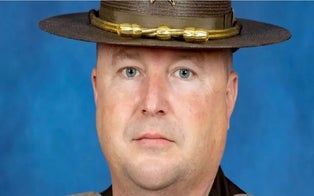I Support the Girls, founded by Dana Marlowe, has distributed more than 3 million bras and menstrual products around the globe.
On a warm winter day in February, women filed into the small building of a nonprofit in Washington, D.C. Some stopped to say hello to familiar faces, and others caught up with friends. Many had been here before, to pick up what they needed from the collection of donated shoes, coats and shirts. But on this day, they all congregated in the center of the room, where a special delivery of bras and maxipads waited for them.
With poverty affecting about 40 million Americans, many women struggle to make ends meet. That means a $10 box of pads each month for their periods may not make the family grocery list. A $25 bra that fits properly can become a luxury. It’s been reported that many women have even traded tampons for food stamps.
For the women in February who visited So Others Might Eat (SOME), a human services agency that supports poor and homeless D.C. residents, they were receiving the bras and sanitary products for free — a welcome help when there are other things to worry about.
Shawn, who is re-entering society, was shopping for bras at SOME’s clothing closet when InsideEdition.com visited.
“I have been diagnosed with breast cancer," she said. "I’m about to have surgery and … I have to wear certain type of bras that I can’t afford to buy because I am not working. It means a lot. I don’t have money to pay for them,” Shawn said.
Shawn’s new post-surgery bra came as part of a donation from I Support the Girls, a nonprofit that collects new and used bras, as well as sealed menstrual products, and donates them to women in need. A 42-year-old mom named Dana Marlowe has been running the company out of her split-level home in Silver Spring, Maryland, for the last four years.
'Everyone Deserves a Bra'
On Feb. 21, I Support the Girls donated 2,293 bras and 4,179 maxipads to SOME. The polka-dotted bras, neon-colored bras, push-up bras and sports bras all overflowed from four large plastic bins on a folding table. Pads and panty liners piled up in a fifth bin.
The women sifted elbow-deep through the bins to find their sizes and color preferences. Some went for bright blues while others wanted classic nudes or basic blacks. A few women were thankful for larger sizes and clasp-extenders.
Picking up a white satin bra with thick, padded straps, one woman laughed at the garment’s “colonial” look. “That’s cute,” she said upon further inspection, tucking it under her arm as she looked for another one.
Another woman, Donna, was happy to have a place to take time out of her day and shop for something new. She hoped that there could one day be special boutiques for her and the other women to visit, where they could be fitted for bras as well. She imagined string lights hanging from the ceilings and red curtains separating the fitting rooms. “It’s the little things,” she said, that would make it “a pleasant experience.”
“Everyone deserves a bra,” Donna added.
Sports bras are the most popular donated item, Marlowe said. There’s more fabric in a sports bra, which can be useful for someone carrying their belongings with them during the day.
Marlowe told the story of Crystal, who specifically requested a sports bra during one donation day. Marlowe said Crystal told her that a sports bra can “double as a purse.”
“I never thought of a sports bra that way,” Marlowe said. “She said, ‘I can put my most precious items there: my family photos, my money, my most treasured items that I don’t want anyone to steal. And I can just slip them into that extra bit of fabric in the sports bra.’”
And while bras have practical uses for the people who wear them, Marlowe said they’re not just physical items.
“This is more than the bra — this is more than a package of pads. We’re giving women dignity. And that’s it, pure and simple,” Marlowe.
For Michelle Garner, that dignity is in how she can present herself to the outside world.
“It makes me feel wonderful. … When I ain’t have a bra, you don’t look right. … It just looks appropriate for you to have on a bra, and you feel like a young lady,” Garner said.
Like Garner, Crystal also wanted to feel good about herself, Marlowe recalled. “‘I really want a red, lacy bra,’” Marlowe remembers Crystal telling her.
Crystal loved to look at magazine covers. "You always see women in red, lacy bras and they always look so happy," Marlowe recounted Crystal as saying. "... 'I really would like to have that feeling of feeling a little bit sexy and wearing it close to my chest, but underneath all of my clothes so it doesn’t put me at risk in my lifestyle. … I’m not always in safe environments and I wouldn’t want anyone to know it’s there, but I’ll know it’s there underneath my clothes and it makes me smile and it’s close to me heart.'"
Marlowe added, smiling: "So we got Crystal a couple of red, lacy bras that day too."
These bras and menstrual products are extremely personal for the women receiving them — but also for the women donating them. Marlowe said many donors include "heartfelt" handwritten notes when they mail their items to I Support the Girls, and they tell stories of giving up things that can no longer be part of their daily lives.
One note reads: "Three years ago I was diagnosed with stage-three breast cancer. I had a mastectomy, lymph node dissection, chemo, radiation and reconstruction — the whole thing. I’m just now on the other side, but if someone will hold onto these bras, which are no longer an option for me, I hope I’m able to help someone else."
Another reads: "I will be having a full hysterectomy this month and will obviously not be needing these in the future. Wanted to make sure someone could have them. Here are some tampons."
Devastating Consequences
Many people can take these undergarments and hygiene products for granted. They can't wait to unhook their bras after a long day, or leave unused pads wrinkled at the bottom of their purses. But these things can also "empower a woman,” Marlowe says. A bra, for example, helps her to “stand up straighter, feel better about herself, have her clothes lay right, more comfortably.”
Otherwise, Garner said, “sometimes we gotta try to wrap ourselves and get some things on our own.”
The idea of women taking other measures to support their breasts was “eye-opening” for Marlowe.
“I’ve met several women who have been keeping their breasts up with old cracked leather belts. … Like the kind that I’m keeping my pants up with, they’re keeping their breasts up with. The discomfort that that makes me feel, to think about how that woman is managing on 100-degree day, living in a hot, sweaty climate, having an old cracked, chafing belt, chafing and rubbing up against her skin because she doesn’t have access to a bra.”
And when women don’t have access to menstrual hygiene products, the consequences are devastating.
Nearly one in five girls has left class early or missed school entirely because she didn’t have access to feminine products. And if a young girl skips school every time she has her period, that puts her 145 days behind her male classmates. In some countries, girls may drop out of school altogether because they don’t have access to proper menstruation management.
“When it comes to providing some pads and tampons, we’re providing a little bit of respite, of dignity, of not soiling your pants or your clothing; of dignity of not having to miss a meal because you need to buy pads or tampons," Marlowe said.
Many women and girls can be left to take alternative measures to manage their menstruation when they don't have hygiene products. Marlowe said she has spoken with women who are forced to use ripped up cardboard or wads of toilet paper.
Wadding up toilet paper in their underwear is likely something many women have experienced when their period catches them by surprise, "but ideally,” Marlowe said, “you’re not experiencing that hour after hour, day after day, month after month.”
Others have told Marlowe that they have “taken a maxi pad and pulled out the inner cotton and wrapped it up to make a makeshift tampon and have several of them from one maxi pad, so that it goes longer.” Or they’re using “the insides of mattresses … or ripped up T-shirts.”
Kate Wiley, SOME’s communication manager, said it’s these products — bras and menstrual products — that many people don't think about when donating to organizations.
“But once you imagine not being able to have access to those things, I think you realize how essential that is … to feeling like you can kind of tackle whatever it is that you need to tackle. So I think having organizations like I Support the Girls and others who come and donate those items, they really make a much bigger impact than I think we would normally think about a bra," Wiley said.
Marlowe recognizes that menstruation is still a taboo topic for a lot of people and cultures, and that there is shame in dealing with it. So along with donating the hygiene products, she works to normalize the conversation.
“The thing about taboo topics is often taboo topics shouldn’t be taboo. … If somebody was like, walking around saying, ‘Oh, your upstairs bathroom’s out of toilet paper.’ I wouldn’t be like, let me just hide it in my jacket and bring it up discreetly. No, I’d bring up the roll of toilet paper,” Marlowe said.
A Family Affair
Being a mom of two young boys, Marlowe said normalization has to start young.
“My kids are involved and they know age-appropriate information about periods and menstruation and they help me bring home pads and tampons and bras. I mean, they’re basically bra mules at school,” she said.
Micah, 10, knows that women have periods and they “need menstrual cups and other things once a month." He said he feels good knowing that he and his mom help people get what they need.
“I’m learning how to bag bras, fold bras, bag maxipads,” Micah said. He also is improving his counting skills, by counting individually sealed tampons.
Seven-year-old Riley added, “I’m learning that homeless women can be stronger because of my mom’s company and feel better.”
Marlowe didn’t expect her sons to become bra mules, or her home to be turned into the headquarters of a global nonprofit. Back in 2015, she had just lost 35 pounds and needed new bras. So she headed to her local Soma lingerie store.
“As I was getting fitted, I asked the sales associate what could I do with my perfectly good old bras that no longer fit,” Marlowe said.
Then, the associate said the four words that changed Marlowe’s life: “Homeless women need bras.”
“That for me was eye-opening,” Marlowe said, adding that she was the kind of person, like many other women, who “just kept shoving bras into my drawer.”
Marlowe realized that inside that drawer were 16 bras she wasn’t using — and could give away. After telling a friend about her plan, Marlowe’s collection instantly doubled. And then she turned to Facebook.
“That first donation was the end of October 2015, and we donated over 1,000 bras and over 7,100 menstrual hygiene products. I thought it was a lot,” Marlowe said.
Making a Difference Worldwide
To date, I Support the Girls has distributed more than 3 million bras and menstrual products around the globe. With 50 affiliate locations worldwide, the nonprofit has donated to 500 organizations, which include homeless shelters, domestic violence shelters, refugee resettlement homes, foster care agencies, LGBTQ agencies and homes for pregnant teens.
Recently, I Support the Girls provided bras and menstrual products to government workers during the shutdown. Turning once again to Facebook, Marlowe received messages from a mother who couldn’t afford all the menstrual products for herself and her three teenage girls, as well as from a mother who had just stopped nursing and needed a new bra to fit her changing breasts, The Washington Post reported.
And these personal items are being sent to Marlowe from every corner of Earth: from Japan and Australia to Canada, the Netherlands, Israel, Taiwan, China, Argentina, Costa Rica, France, England, Ireland, Portugal and Spain.
"The wild part of it is that these are strangers mailing me their undergarments,” Marlowe said.
Many are mailed straight to her — or at least a tiny P.O. box at the local post office. But because the box is only big enough to hold a few small letters, the post office has turned into a makeshift receiving center for I Support the Girls.
In a given week, Marlowe can receive over 100 packages, so she must drive her van up to the post office's large loading dock as employees wheel out big industrial-size rolling baskets that are overflowing with packages. Then, like a game of Tetris, Marlowe packs them strategically into her van so they all fit. When she's done, she can't even see out the back window.
Marlowe then brings the packages back to her basement, which doubles as her family’s movie room and the I Support the Girls sorting center. Meticulously noting each package’s return address so she and other volunteers can write a thank you note to the sender, the donations are unpacked, counted, and bagged for distribution — awaiting to be taken to an organization or to be picked up. And the cycle continues.
But Marlowe wants people to know that there’s "nothing innately special" about her, and that anyone who wants to help … can.
"I'm not a medical professional, I'm not a social worker, I'm not somebody with a background in reproductive health management or menstrual hygiene management. I'm just a woman with a period, right? But if somebody like that ... if just a regular woman with a period can go out and talk about why these products equate to dignity and how to break the taboos and normalize it and remove the stigma and advocate for policy, well then anyone could do it," she said.
Added Marlowe, "I'm just a suburban mom" — whom strangers are mailing their undergarments to.
RELATED STORIES





